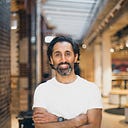7 Books That Changed The Way I See The World
These are 7 of the books that have given me a new perspective on the world, from different parts of my life — books that gave me new eyes and a lasting change in how I make sense of things. There’s some things you can’t unknow once you know them…
To Kill A Mockingbird by Harper Lee
I first read this book when I was 14 years old and there’s no other book from my childhood that opened my eyes like this did. It sparked several things at once, many of which I was feeling for the first time: rage at injustice, the impermanence of innocence, fundamental inequity in the world. It also subtly asked me questions of my own identity as a racial minority in the UK. I read it again 20 years later and found it held the same power.
Owning Your Own Shadow by Robert A. Johnson
According to Jung, we all have a shadow — the part of our ego that is hidden to us yet still influences us and contains enormous power. I read this as an entry into shadow work and suddenly many things made sense. Shadow can be summarised as the things that we learned were ‘unsafe’ to express early in life, and thus became part of our Shadow. This includes things that are useful to resist in order to function (like learning that violence is bad) and also things that were simply not considered useful or good by family, friends & society (like expressing emotion). What this short book invokes is a need to understand what lies in our Shadow so that we might understand ourselves better and tap into powerful potential.
A New Earth by Eckhart Tolle
There are a few books that I think everyone should read and this is one of them. Tolle is one of the great spiritual teachers of our time and part of his impact is in how we demystifies what it is to be alive and how we must explore our relationship with our own thoughts if we truly want to live fulfilling lives. What I love is that thinking and writing like this is where spiritual concepts like impermanence meet physics: we can only be in this time and space, yet we spend most of our lives thinking about the past or future. Don’t be put off by the word ‘spiritual’, much of what he describes is cold, hard logic that will change the way you experience the world if you allow it to sink in.
Nineteen Eighty-Four by George Orwell
I was in my 20s when I read this and immediately wished I’d read it earlier in my life. What’s astonishing is that it only seems to become more relevant as time goes on. It was published in 1949 yet it eerily speaks directly to the challenges we face now from big tech, social media, the erosion of society and creeping authoritarianism — with a love story at the heart of it all.
Tribe by Sebastian Junger
Junger is a war correspondent and documentary maker who has seen some of the world’s most brutal conflicts close-up in Bosnia, Iraq, Afghanistan and Nigeria. This book is a compelling and provocative argument that our modern societies have eroded the fundamental importance of community and connection. He uses several examples from Native American tribes, the Blitz in London and US soldiers returning from modern conflict unable to readjust to what we consider normal society. Some feel it glamourises war, but that’s not the message I took — it’s that the existential demands of war seem to be the only things that pull down the barriers we’ve built that prevent us from connecting.
Hiroshima by John Hersey
Regarded as one of the best books ever written about war, it’s a meticulously researched work following six survivors of the bomb dropped on Hiroshima. It’s an unflinching account of the horror one nation inflicted on another, to innocent and ordinary citizens. Yet, its impact is much wider than this and caused me to rethink what I know about modern history. The most chilling part of the book comes in the final chapters as the individual survivor stories are interspersed with a timeline of major nations around the world testing and arming themselves with the same weapons that have unleashed such devastation. It forces us to consider ourselves as a species with the unique traits and capacity for self annihilation.
Media Control by Noam Chomsky
This is perhaps another book I feel everyone should read. Chomsky outlines in compelling detail and reasoning how Western governments and the media work together to further their own agendas, including “manufacturing consent” for actions such as wars. It was first published in 1991, way before 24-hour news and social media, yet has only become more relevant. Chomsky’s frustration is evident when he explains that almost everything he’s presenting is publicly available information, from sources like The Library of Congress. He’s done the heavy lifting of researching, digesting and presenting the fundamental significance of these issues to us, yet we’re still unwilling to listen.
I hope you find at least one that you’re compelled to read, explore & enjoy 🙏🏽
